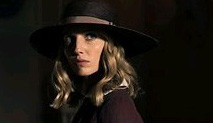Those of us who do not travel to film festivals have been waiting to see ABOUT ELLY since 2009, when the film won the Silver Bear at the Berlin Film Festival. Thanks to issues of "rights," this movie has remained in "American limbo" since then. Written and directed by Asghar Farhadi, who went on to give us the Oscar-winning A Separation and then The Past, the film is at last being distributed by The Cinema Guild and hits the U.S. with its theatrical premiere this Wednesday, April 8, here at Film Forum in New York City, before arriving in another 16 cities across the country, beginning in May.
In addition to being, for this viewer at least, the best of Farhadi's three films that I've seen, About Elly also gives us further clues as to why this filmmaker, shown at right, is so able to work seemingly unmolested by censorship, house arrest and the like -- unlike, say, Jafar Panahi. Farhadi is one hell of a lot subtler than Panahi, as well as much more dramatically compelling in his stories.
The filmmaker shows us what look like middle-class (tending toward the upper) characters, who rarely if at all appear to be religious and who would -- except for their language and the headdress of the women -- be nearly indistinguishable from those of many European countries and, hell, even from us here in the USA. No wonder Farhadi's films are so popular with the cinematic elite of the western world.
Further, the concerns of these characters mirror so many of our own -- from the usual man/ women relations to child-rearing and -schooling to setting up one of their good friends with a possible "significant other." More important, where fundamentalism is concerned, whatever problems these people have can easily be attributed to their own faults and misdeeds, particularly those of the women on view -- something that would of course appeal to a fundamentalist/ patriarchal society like Iran (and OK, a few other countries, too.)
And yet I don't believe for a minute that Farhadi truly feels this way himself. Look at what happens in A Separation or About Elly (The Past is set in France and so wiggles out a bit from my theory), and you see people so constricted by their society and its mores that they have no genuine control of their lives -- except by towing the party line.
When something mysterious and possibly fatal happens in About Elly -- the sudden disappearance by the sea of one of the main characters, which will put movie buffs in mind of L'Avventura -- watch what occurs between a husband and his wife, the latter of whom turns out to know much more than he (or we) realized about Elly, and who has kept these facts from the rest of the group. What we get is sudden anger, then verbal and physical abuse. To us this may be shocking, but you just know it will please those religious censors.
About Elly seamlessly weaves its exposition into smart, believable dialog between these friends as they head out and arrive at their seaside week-end away. We learn tons of information about all of them, piecemeal, and over the long haul. What we learn about Elly makes us concerned and uneasy, though we won't understand why for quite some time.
How these people handle themselves, their friends, their children, smacks so thoroughly of the way we all do the same -- with affection and hypocrisy, lies both white and black, trying to balance self-interest with reputation. The big difference here is the society under which the characters must live. And that, to Farhadi's great credit, changes everything -- for everyone, including especially Elly.
Finally it seems, almost everything here is a lie, thanks to a culture based on them -- due of course to that exquisite combination of faith, religion and political power. If the shy school-teacher Elly at first seems to be the outsider, by the finale it is difficult not to see every character as somehow "outside" the norm -- or would be, if the truth were to come out.
As a filmmaker, Farhadi balances visuals and dialog extremely well. He gives his cast all the room they need, and each comes across with a beautifully specific performance, while blending seamlessly into the ensemble. I am not going to list them all because each is as good as the next. And several cast members -- women and men -- are exquisitely beautiful, to boot. The filmmaker's final image, by the way, is a great one.
About Elly -- running almost exactly two hours, in Persian (with a bit of German) and translated with English subtitles -- opens this Wednesday, April 8th at New York City's Film Forum. You can see all currently scheduled playdates, with cities and theaters listed, by clicking here and scrolling down a bit.























.jpg)
.jpg)

.jpg)

.jpg)

























